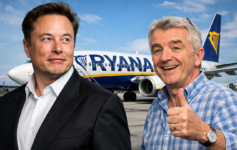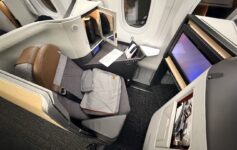Airlines in the discount sector in the United States have announced losses in their recent quarterly reports. There’s been much speculation, but I have an alternative theory.
If you are considering booking travel or signing up for a new credit card please click here. Both support LiveAndLetsFly.com.
If you haven’t followed us on Facebook or Instagram, add us today.
Quarterly Losses Across The Low Cost Sector
Frontier reported Q3 2023 earnings on October 26th, 2023. Here are the key points:
- Total operating revenues were $883 million, 3 percent lower than the 2022 quarter, on capacity growth of 21 percent
- Cost per available seat mile (“CASM”) was 9.66 cents, a decline of 9 percent over the 2022 quarter
- Achieved adjusted CASM (excluding fuel), a non-GAAP measure, of 6.66 cents, 3 percent lower than the 2022 quarter
- Pre-tax margin was (5.1) percent
Despite 21% more capacity, they lost $45MM compared with earning $47MM the prior year, the same quarter.
Spirit reported a GAAP-adjusted loss of $178MM with Ted Christie announcing changes to their strategy:
“Softer demand for our product and discounted fares in our markets led to a disappointing outcome for the third quarter 2023. We continue to see discounted fares for travel booked through the pre-Thanksgiving period. And, unfortunately, we have not seen the anticipated return to a normal demand and pricing environment for the peak holiday periods. Given these continued trends, we are evaluating our growth profile and our competitive position. We have already taken the first steps by modifying the cadence of our aircraft deliveries through the end of the decade and slowing our capacity growth in the near term.” – PR News Wire
JetBlue announces earnings on Halloween that many fear may be spooky.
Three Popular Theories
Pundits everywhere, on the Boarding Area network, mainstream media, and amongst those in the industry have theories as to why the sector is struggling.
Softening Demand
The clear and obvious choice to anyone with a business degree is that inflation has (finally) affected the bottom of the market enough to slow discretionary spending. However, that’s not really the case. Discretionary spending across the economy remains elevated despite historical precedence given current inflation over the last three years and the highest interest rates seen since the credit crunch in 2008.
Another reason this theory doesn’t pan out is because Royal Caribbean Cruise Lines continues to report “unprecedented demand.” Spirit and RCCL are similar, though not precisely the same market strata. It’s similar enough, however, to surmise that it’s not a softening at the bottom of the market.
Lower Airfare Prices
Spirit CEO, Ted Christie, cited that ticket prices had not recovered to 2019 levels and that the holiday peak season demand is soft. That might explain some for Spirit and give credence to the other two theories but then how does that apply to Frontier who also reported a loss? It’s not the ticket price in my opinion, but I will dive into that in a section below.
Merger Posturing
A theory that has popped up in a few places, is the notion that Spirit, in particular, is posturing their balance sheet to make a merger with JetBlue a better option for the government. While it wouldn’t be unique for a company to make its books look more or less desirable depending on the outcome, I have met Ted Christie, Spirit’s CEO, and don’t think this is the case for two reasons:
- Artificially depressing the books runs more risk than benefit. If the merger, which is currently contested by the Department of Justice, is denied, Spirit will look less healthy than it did before merger discussions began. If the stock is being propped up on built-in value from JetBlue’s acquisition, and the acquisition isn’t ultimately approved, then Spirit is in a terrible position and management will have to find a way out without the backing of the market.
- There is so much attention and scrutiny on the JetBlue deal that anything that could even be misconstrued as cooking the books would be quickly found and brought to light. Remember that a private group of investors previously tried to suggest that JetBlue had baked in fare increases of up to 40% in a document they wrote but positioned as coming from JetBlue. There’s no room for chicanery.
Changes In Fees
Spirit has dramatically increased some of its fees in the last six months at least, maybe longer. During higher demand periods, that might go unnoticed because, frankly, everyone is high. Remember too, that in the Basic Economy market, which is the network equivalent to ULCC fares, had some of the same fees six to twelve months ago. If Spirit Airlines or Frontier compete with American Airlines on a given route, they all charge for seat assignment, checked luggage, and so on. United has said that its strength in the Basic Economy sector has been one of the reasons why they have succeeded in the last quarter. The segment now accounts for 12% of domestic passengers and is up 50% vs the same quarter last year.
Spirit increased most fees dramatically sometime over the last year. A move to a Big Front Seat was nearly standardized at $50 and almost always sold out. Now, however, the $50 upgrade has become a unicorn with most that I have seen falling about 3-4x as much. In fairness to Spirit, they still tend to sell out or close so it’s probably a winning strategy.
However, there are just 8-11 Big Front Seats (depending on the layout and equipment.) The other 160-180 passengers on board face carry-on and checked luggage prices that have soared from $38-45/each way to $80-95. I recently encouraged a friend to take the nonstop on Spirit over a connection on another carrier at the same price, but they were hit with $360 in carry-on charges (2 passengers x 2 segments at $80/each.) They would have paid less overall with American, though adding a connection. (Southwest also offers a nonstop but even with free carry-ons and checked luggage they remained substantially higher than the rest of the market.) This wasn’t true just a few months ago.
The ticket price – which is weighted less in Spirit’s model – is quickly diminished when looking at the total cost of the trip. That’s what Spirit has trained customers to do and they continue to do the math, only now, Spirit is no longer the best value.
Conclusion
Leading theories have ranged from a softening economy (at least at the bottom) struggling to keep up with prices and inflation to making themselves better positioned for an acquisition target (in the case of Spirit.) Royal Caribbean pours water on the softer economy, and Frontier’s struggles eliminate the possibility that this is an argument for acquisition to the government. I believe, and I may be alone in the world on this, that doubling, tripling, even quadrupling ancillary charges already higher than network carriers is the culprit. We will see in the next few months who was right.
What do you think? What explains the trouble that discounters are having despite United and RCCL’s success in the same market segments?




Also have to consider some the psychology behind consumer purchase decisions. Since mid-2020, consumers have seen fees on top of fees added to their purchases, and not just travel, but at small businesses, restaurants, etc…
Perhaps, there is something to be said for Americans being done with being nickeled and dimed at every turn. There’s some satisfying about purchasing a $150 ticket on United vs. a $50 ticket on Frontier, knowing you won’t be asked for money at every interaction.
I hypothesize that Spirit’s model required a combination of a cheap consumer on a budget who also would be stuck with the extra fees because they can’t read the fine print. Someone whose poor AND naive (which happens more than one might think.) In the short run, this business model works but even the dim witted figure out how to play the game eventually. If they don’t switch airlines outright, they may learn how to fly with only a “personal item” and borrow clothes from their relatives. If they travel as a family, they may do what I have done for years: One giant 40lb bag everyone stuffs into. Due to recent regulations requiring at least one parent seated next to a child, they live with flying apart from each other for a few hours.
They adapt.
And perhaps Spirit thought they adapted as well by seemingly raising the prices on checked bags essentially saying that you’ll still pay more even if you make the effort to consolidate your bag but then… they alienate the, say, couple who both carry-on bags and have a checked bag each and get hit with $170 one-way fees and just switch airlines outright. So they alienate the most profitable customers while the frugal ones adapt yet even more.
It’s not a big secret anymore that Spirit hits you with a sneak fee for booking online where you can save by going to the airport so perhaps THOUSANDS of flyers are doing that nowadays. If you’re so poor you’ll fly Spirit to see Grandma and your time has less value, it may make sense to take a 1 hour bus ride to the airport and wait in line to save $200 on online ticketing fees. This also adds overhead work to the Spirit gate agents as well.
After all, if these fees are so loathed particularly by the working class that flies on such an airline, it’s difficult to pity them if they can’t learn by the 2nd or 3rd flight how to beat the system.
The fee increases are an underappreciated factor, yes. Did Frontier raise fees as well?
I’d discount the cruise comparison some as those are probably more retiree heavy, and they have enjoyed big social security cost of living increases
“I recently encouraged a friend to take the nonstop on Spirit . . . ”
Friends don’t encourage friends to fly Spirit.
I’ve wondered if at some point, their well-earned reputations would catch up with them. How many bad experiences does it take before a certain amount of your potential customer base begins to think it’s not worth it to try to save a little money?
The US ULCC’s have a bad, broken business model, which has been further exacerbated by the legacy US carriers rolling out “basic” economy. There is absolutely no compelling reason to take Spirit, Frontier, or Allegiant unless the city pairing isn’t replicated by on the of the big four US carriers and there is no other choice.
Don’t forget the shift in cash flow for those attracted to Frontier & Spirit.
Just a year or two ago, Uncle Sam was handing out checks for free. Now the checks have stopped and student loans have come due again. Big cat fight on Capital Hill when it comes to cancelling student loans.
Also, the PAX that these airlines attract are not necessarily the same as those at Carnival Cruise line. These seafarers have more substantial jobs (medical, management, production, government, etc).
The girl or guy in a NK or F9 seat is just getting by working overtime at an Amazon warehouse (ie: the poor are getting poorer)!!